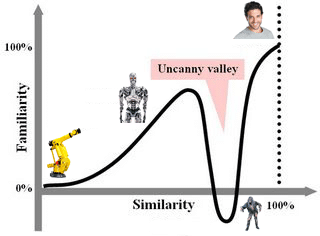The Uncanny Valley Of Fluency Advanced English Learners Experience

The concept of fluency in language learning has always been an area of importance and fascination. For advanced English learners, achieving a high level of proficiency often becomes the ultimate goal. However, as they approach near-native levels of fluency, an intriguing phenomenon known as the “uncanny valley of fluency” begins to emerge.
Take the first steps to becoming proficient in English with our Frederick Reading App.
What Is The “Uncanny Valley Of Fluency?”

The “uncanny valley of fluency” is a term that refers to a peculiar psychological response experienced by individuals when encountering someone who appears fluent but falls just short of native-like mastery. It is named after the uncanny valley concept in robotics and animation, where human replicas that closely resemble but fall short of being completely realistic are perceived as eerie or unsettling.
Similarly, in language learning, when an individual speaks with exceptional fluency but exhibits subtle linguistic differences from native speakers, it can create a sense of unease or disconnection for both the learner and those interacting with them.
What Do I Need To Know As A Non-Native Speaker?
When a native English speaker meets someone who doesn’t know any English, there’s nothing odd or surprising about this person being unable to speak English. The same is true for an intermediate speaker who knows many words and phrases but still makes some mistakes.
A native English speaker listens to English learners at this level and understands that they’re students who know a lot but still have a long way to go. The problem happens when natives listen to advanced learners who almost speak perfectly.
These speakers often use native phrases but are incorrect by a single word or two. Or their pronunciation is nearly native, but there are one or two sounds they just can’t make properly.
These learners can ALMOST be mistaken for natives. When natives hear this “almost native” speech, they become disconnected mentally from the student for a brief moment as they realize they’re speaking with a non-native rather than another native.
This is what is called The Uncanny Valley of Fluency.
Now, this doesn’t mean native speakers aren’t very impressed by advanced speech or that they actually feel uncomfortable when advanced learners make tiny mistakes. Actually, they are!
But it does mean that learners at this level begin to be seen just a bit differently, like a robot that’s almost human. You might be amazed by a robot that’s ALMOST human, but you’re never completely fooled into thinking it’s really human.
In the following paragraph, see if you notice the speech that’s almost native:
“In these days, I’ve been taking dancing lessons. I’ve been asking my instructor for advices, but I don’t seem to be getting somewhere. I’m an optimistic, though. If I just keep on going on, I’m sure I’ll get better.”
Generally, it’s a great speech that a native understands. But it’s also slightly “off,” a native expression meaning “weird” or “different.”
Here’s what a native would say:
“These days, I’ve been taking dancing lessons. I’ve been asking my instructor for advice, but I don’t seem to be getting anywhere. I’m optimistic, though. If I just keep on keeping on, I’m sure I’ll get better.”
Of course, there’s nothing “wrong” with this level of English. And these mistakes are usually very tiny. But for those learners who really want to take their English to the NATIVE level — and this is very possible — this kind of speech can make you feel “so close, yet so far away” from your goal.
Why Must You Understand The Uncanny Valley Of Fluency To Sound Like A Native English Speaker?
Understanding the concept of the uncanny valley of fluency is beneficial for those who want to sound like a native English speaker because it sheds light on the subtle distinctions that set native-like fluency apart from advanced proficiency. By acknowledging this phenomenon, learners become aware of the challenges they may face in their language acquisition journey and can address them more effectively.
By understanding this concept, learners can identify areas where their speech might still deviate from that of a native speaker. This awareness empowers them to focus on these specific aspects through targeted practice and refinement. It helps individuals refine their overall linguistic competence by paying attention to even minor details that contribute to sounding truly fluent like a native English speaker.
How Can I Speak English Fluently To Get Past The Uncanny Valley Of Fluency?
To speak English fluently and overcome the uncanny valley of fluency while attaining a higher level of mastery in English, there are several strategies you can employ:
- Immerse yourself in an English-speaking environment as much as possible
- Regularly engage in conversations with native English speakers to sharpen your pronunciation, intonation, and idiomatic expressions. Seek feedback from them on any areas that may need improvement.
- Continuously enhance your vocabulary by reading books, newspapers, and online articles
- Supplement your learning with our online resources and language learning platforms that provide comprehensive lessons and interactive exercises
- Acknowledge areas that need improvement and actively work on refining those aspects of your language skills
- Fluency goes beyond language proficiency; it also involves understanding the cultural nuances that influence communication. Familiarize yourself with the customs, gestures, and societal norms to enhance your overall fluency.
- Develop a confident mindset when speaking English. Embrace any mistakes as opportunities for growth rather than viewing them negatively.
How Long Does It Take To Be Able To Speak English Fluently Like A Native English Speaker?
The time it takes to speak English fluently like a native English speaker varies from person to person and depends on various factors, including your starting level of proficiency, language learning aptitude, immersion opportunities, dedication to practice, and the quality of instruction received. Generally speaking, achieving native-like fluency in any language is a long-term goal that requires years of consistent effort.
Get Fluent From Anywhere With EnglishAnyone
Ready to take your English fluency to new heights? With EnglishAnyone and our comprehensive language learning platform, you can get fluent from anywhere in the world. Our engaging lessons, interactive exercises, and real-life simulations will help you bridge the uncanny valley of fluency and speak English with confidence. Start your journey toward native-like proficiency now.
Become fluent and confident in English with My Fluent for Life Program today.
Related English Language Learning Articles:
How Long Does It Take To Become Fluent In English?
How to Sound Like a Native English Speaker: 7 Tips for Better Pronunciation
